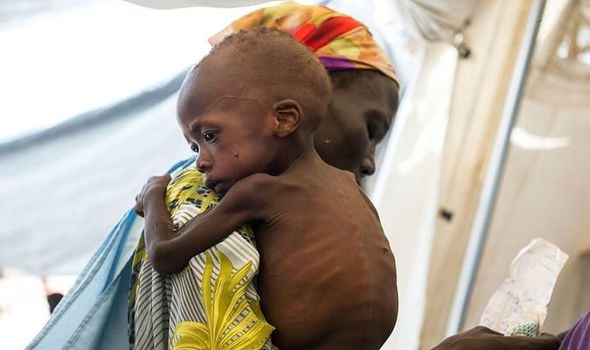NGO Alerts: Sudan’s Hunger Crisis Hits ‘Famine-Like Proportions’

- Sudan faces a historic starvation crisis affecting over 26 million people
- Ongoing conflict disrupts food production, worsening hunger.
- Millions are displaced, facing limited food and medical access.
- Rising malnutrition, especially in children, poses serious health threats.
Sudan is facing a catastrophic starvation crisis, described by NGOs as historic in scale, with the international community’s silence labeled as “deafening.” Current estimates indicate that over half of Sudan’s population, nearly 26 million people, are impacted by this severe hunger crisis. The situation has worsened significantly due to the ongoing conflict, which has persisted for almost a year and a half, disrupting food access and agricultural activities.
The war, which initially began in urban areas, has now expanded into Sudan’s central and southeastern regions, where the majority of the country’s food production occurs. This escalation of violence has severely hindered both farming and the distribution of food, exacerbating the already dire situation. With crucial agricultural zones under siege, many communities face a total loss of access to food resources.
In a recent conversation with Will Carter from the Norwegian Refugee Council, he highlighted the urgent need for international intervention and support. Speaking from Port Sudan, Carter emphasized the gravity of the crisis and the critical role that aid can play in alleviating suffering. He noted that humanitarian organizations are struggling to reach those in need due to ongoing hostilities and logistical challenges.
The humanitarian situation is further complicated by the displacement of millions. As people flee conflict zones, they leave behind their homes and livelihoods, compounding the hunger crisis. Many displaced individuals find themselves in overcrowded camps, where access to food and medical care is severely limited. The lack of resources in these camps has made it increasingly difficult for families to survive.
Carter also pointed out that the health consequences of the hunger crisis are alarming. Malnutrition rates, particularly among children, are rising at an alarming rate, leading to long-term developmental issues. Without immediate assistance, the potential for a public health disaster looms large, with diseases linked to malnutrition spreading rapidly.
In light of this dire situation, NGOs are calling for the international community to take swift action. They stress the importance of providing humanitarian aid and support to restore food production and improve access to essential resources. Without a concerted global effort, the situation in Sudan could deteriorate further, leading to even greater loss of life.
The ongoing crisis in Sudan serves as a stark reminder of the devastating impact of conflict on food security. As the world watches, the urgent need for action has never been clearer. Addressing the hunger crisis and supporting affected communities must be prioritized to prevent a full-scale famine and ensure a better future for millions of Sudanese people.






